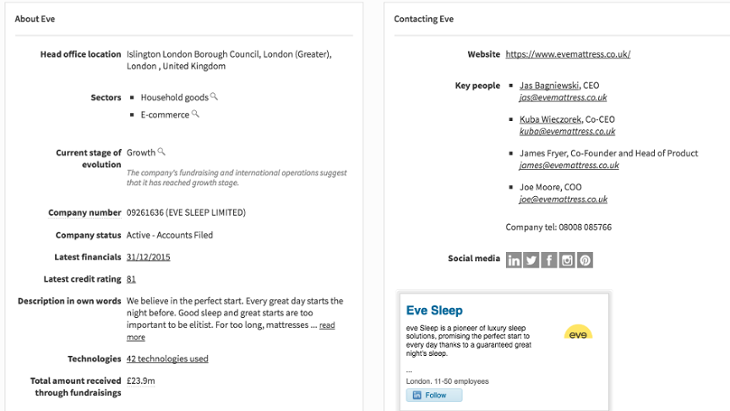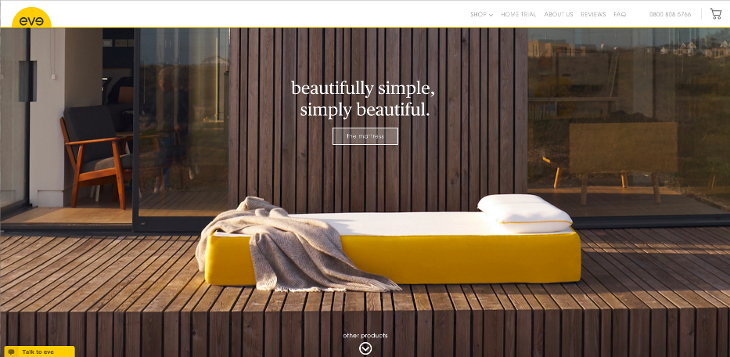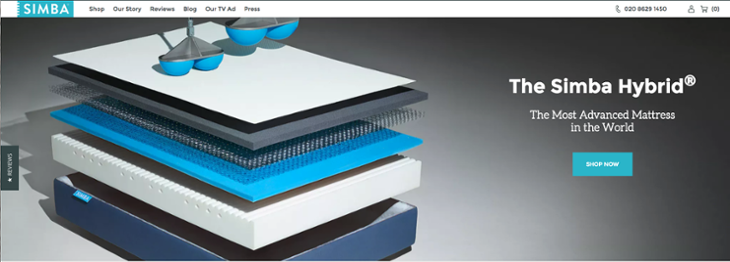Cash in the mattress: investors jump on UK bedding startups
| Beauhurst
Category: Uncategorized
Bedding is not a sector traditionally associated with rapid growth or private equity. But approximately 12 years ago, that changed. 2004 was when UK startup Duvalay, a luxury travel and camping company, was founded. Despite Duvalay’s failure to emerge further since, the company made headlines when it received funding to the tune of £80k from Dragons’ Den. It is now moderately well-known and features products ranging from a 15cm-deep ‘Golden Eclipse’ mattress (retailing at £380) to a ‘Faux Antelope Fur Pet Bed’ (£25).
Its small market share belies, however, the monumental change seen by the mattress industry since Duvalay’s genesis. The start of 2010 saw bedding startups such as Balluga emerge, advertising ‘interactive Smartbeds’ and securing an unannounced fundraising in early 2011. Our team has identified that funding as just under £370k, valuing the company at £1.3m.

By 2014, Eve Sleep had cottoned on and entered the bedding startups market promising a single, straightforward design to replace traditional mattresses. It received its first funding from DN Capital and FL Labs in February 2015, and has since received funds from bodies including the Channel 4 Growth Fund and Woodford Investment Management (in one of the latter’s infrequent forays into consumer goods). In July of this year Eve was valued at £22m; having received more than £20m in investment since, it is likely that this has increased.

The final player is Simba Sleep, registered only last year. Simba, like Eve, offers only one mattress, advertising it as uniquely advanced and replete with 2,500 conical springs. Having received £7.5m in two funding rounds – from investors such as JamJar, established by Innocent Drinks, and Sir John Hegarty – Simba is valued at over £14m, thus dramatically outpacing Balluga and Duvalay. This is doubly impressive given that just under half its value has not come from equity funding.
The market is even bigger in the US: there, the bedding industry has exploded to the extent that it was last year valued at around $15bn (£12bn) – making it nine times the size of our own.
So why have bedding startups only sprung up now? In an interview with Stephen Levitt, author of Freakonomics, Rice University professor of marketing Utpal Dholakia attributed it to a transatlantic expansion of retail in general. This is combined with the fact that mattresses are relatively cheap to produce, and sold at considerable markups: consumers’ price expectations have always been high, allowing startups to corner the market by selling themselves as innovative. Eve and Simba, the two leading lights of the UK industry, could both be described as growth-hackers.

This is particularly remarkable given that both sell almost exclusively online: whilst Eve has one London-based ‘nap station’, neither has dedicated shops (Simba’s website notes, with apparent reluctance, that some John Lewis stores stock their products). For the most part, then, both require a leap of faith on consumers’ behalf. That is where the companies’ marketing excels. Both sites look for all the world like they could sell an app or banking platform; they advertise the brand first, mattresses second. And their brands are beautifully crafted.

So, innovative mattresses are here to stay. And if the last twelve years are anything to go by, investors in the industry can certainly sleep easy.
This article is part of the forthcoming edition of The Deal – our comprehensive review of investment in the last quarter. Read the previous edition here.
Discover the UK's most innovative companies.
Get access to unrivalled data on all the businesses you need to know about, so you can approach the right leads, at the right time.
Book a 40 minute demo to see all the key features of the Beauhurst platform, plus the depth and breadth of data available.
An associate will work with you to build a sophisticated search, returning a dynamic list of organisations matching your ideal client.